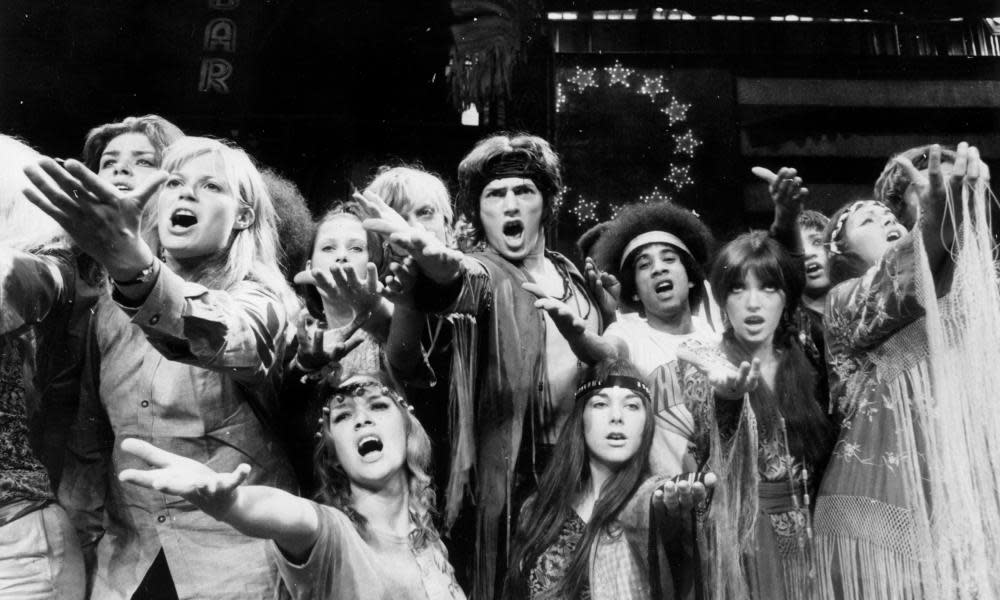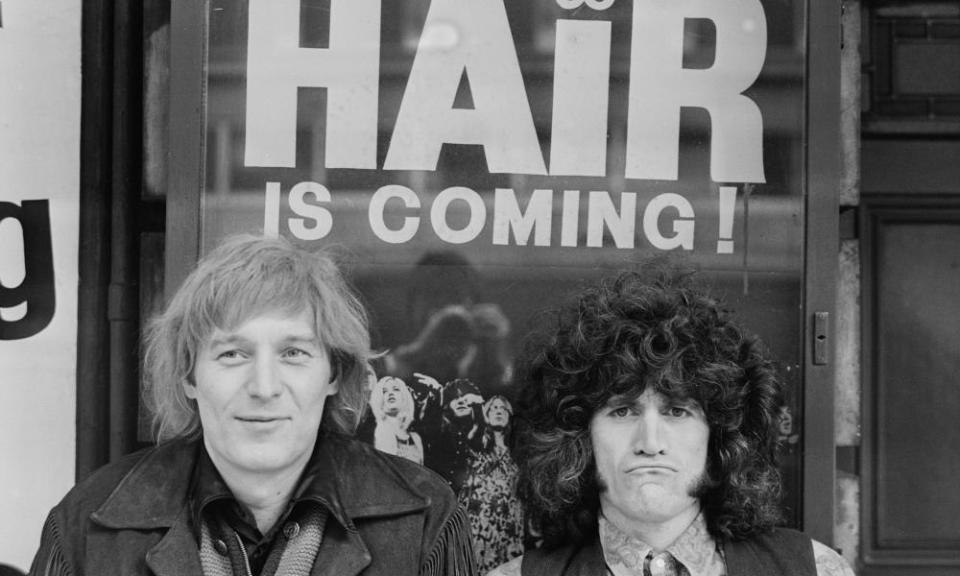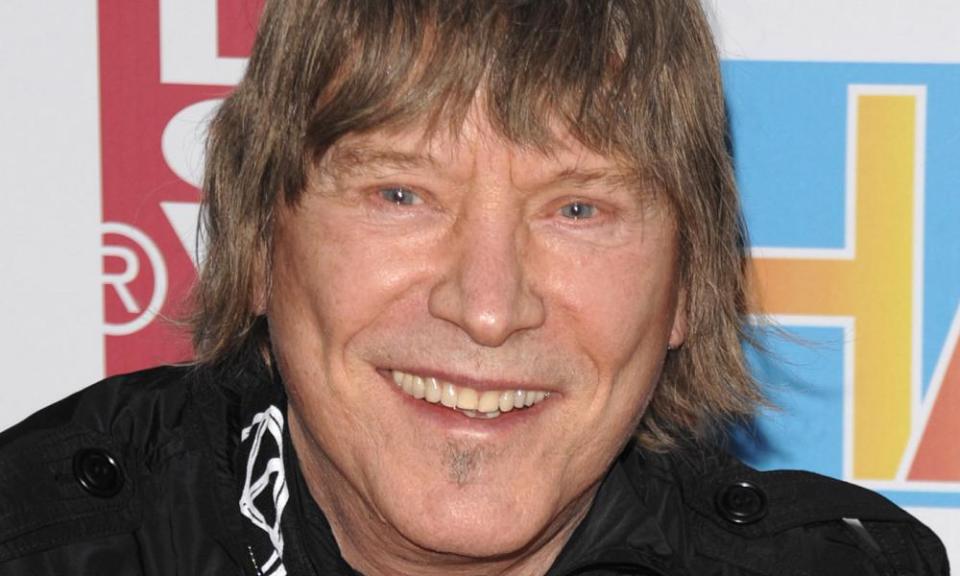James Rado obituary

For all its hippy-drippy dawning of the Age of Aquarius aspect, Hair (1967), the first theatrical rock musical – billed at the time as “the American Tribal Love-Rock Musical” – had its roots in both the vibrant, radical off-Broadway theatre of the mid-1960s and the emotions, experience and political anger of the writers and actors involved.
The lyrics and libretto were the work of James Rado, who has died aged 90, and his colleague and sometime lover Gerome Ragni, who had participated in that off-Broadway ideological maelstrom with Joe Chaikin’s Open Theatre and Ellen Stewart’s La Mama.
Rado was already writing songs and acting in New York – he had appeared on Broadway in 1963 in June Havoc’s play Marathon ’33, about the dance marathons in the Depression era, supervised by the acting guru Lee Strasberg – when, in 1964, he met Ragni as a fellow off-Broadway cast member in the British hit protest revue (about capital punishment) from Oxford University, Hang Down Your Head and Die, devised by David Wright and staged by Braham Murray.
This was not a success, though it had caused a sensation in London. It closed after one performance. But Rado and Ragni always insisted this was the spur to getting on with Hair immediately afterwards as they hunkered down in their apartment in Hoboken, New Jersey.

When they came to London in 1969 to support Murray’s production of a rock musical version of Othello, Catch My Soul, at the Roundhouse, Rado goofed for the cameras, grabbing Murray: “This is the guy who inspired Hair!”
In truth, the creative spark for Hair was a meeting with a quiet Canadian, Galt MacDermot, who was introduced to the pair by a music industry colleague. Older, and staider, than the hirsute hippies, MacDermot was a serious and renowned jazz musician, composer and church organist. But once he took hold of the scribbled lyrics and storyline, he produced a rock/funk score of astonishing beauty, poignancy and anthemic power.
Rado and Ragni’s authentic New York expression of the counter-culture protesting against the Vietnam war, tripping on LSD, frightening the tourists and heralding inter-racial sexual liberation, took its title from a painting, Hair, by the pop artist Jim Dine. And it found its first producer when Ragni recognised the director of the New York Shakespeare Festival, Joseph Papp, at a station in New Haven, Connecticut, and gave him a bound script.
Papp’s interest was aroused, but he decided on Hair as the opening show in his new Public Theater on Lafayette Street in the East Village only once he had heard MacDermot’s music. The show opened on 17 October 1967 with the 32-year-old Ragni as Berger, nominal leader of the “tribe”; Rado, at 35, was thought too old to play Claude, the doomed protagonist, a character based on himself.

After an eight-week run at the Public, the show seemed unlikely to move on to Broadway until a wealthy young would-be politician, Michael Butler, godson of Tyrone Power and a friend of the Kennedys, kept it alive in a nightclub, Cheetah, on West 53rd Street and then – with a new director, Tom O’Horgan, and Rado restored to the cast as Claude – took it on in April 1968 to the Biltmore theatre, in April 1968 where it was a Broadway sensation and ran for 1,750 performances.
The show’s opening in London at the Shaftesbury theatre in September 1968 was timed to mark the demise of the Lord Chamberlain and censorship in the theatre, and was even more successful, running for five years and only halted when a section of the theatre’s ceiling collapsed overnight. As on Broadway, the cast – which included Elaine Paige, Marsha Hunt, Paul Nicholas and Richard O’Brien – stripped naked at the end of the first act.
The rest of Rado’s professional life was mostly devoted to keeping the flame alive in other productions of what Newsweek dubbed “the greatest global cultural event of the 60s” across the US and around the world. When the show was revived on Broadway and at the Gielgud theatre in London in 2009 in Diane Paulus’s stunning production, he spoke openly of his continuing identification with the show’s message of love and peace, of being an “omnisexual” and how his relationship with Ragni, the love of his life, was central to the musical.
Born in Los Angeles to Blanche (nee Bukowski) and Alexander Radomski, a sociologist who taught at the University of Rochester in upstate New York, James was brought up in a Rochester suburb, Irondequoit, and in Washington. He graduated in speech and drama from the University of Maryland, served in the US Navy for two years and then studied further in drama at the Catholic University in Washington. Moving to New York, he wrote pop songs, formed a band, James Alexander and the Argyles, performed in summer stock and studied method acting with Strasberg.
His mainstream Broadway career resumed briefly in the 1966 premiere of James Goldman’s The Lion in Winter, in which he played the young Richard the Lionheart opposite Christopher Walken in a cast led by Robert Preston and Rosemary Harris before being fully derailed by Ragni, who was full of the off-Broadway buzz and bolshie-ness in Greenwich Village. His life changed and he only ever returned to Broadway in jeans, bandanna and tie-dye T-shirts.
There was an inevitable separation after Hair when each of them pursued other projects, Ragni with MacDermot (a disaster called Dude) and Rado with his brother Ted – an off-Broadway Hair sequel, The Rainbow Radio Roadshow, in 1972 and later, also with Ted, American Soldier. He reunited with Ragni in 1974 on Sun (Audio Movie), an environmental musical and on the equally unsuccessful Jack Sound and his Dog Star, Blowing his Final Trumpet on the Day of Doom (1978). Ragni died in 1991. Hair outgrew them all and still rocks.
Rado is survived by Ted and three nieces.
• James Rado (James Alexander Radomski), actor, writer and lyricist, born 23 January 1932; died 21 June 2022

 Yahoo Movies
Yahoo Movies 
